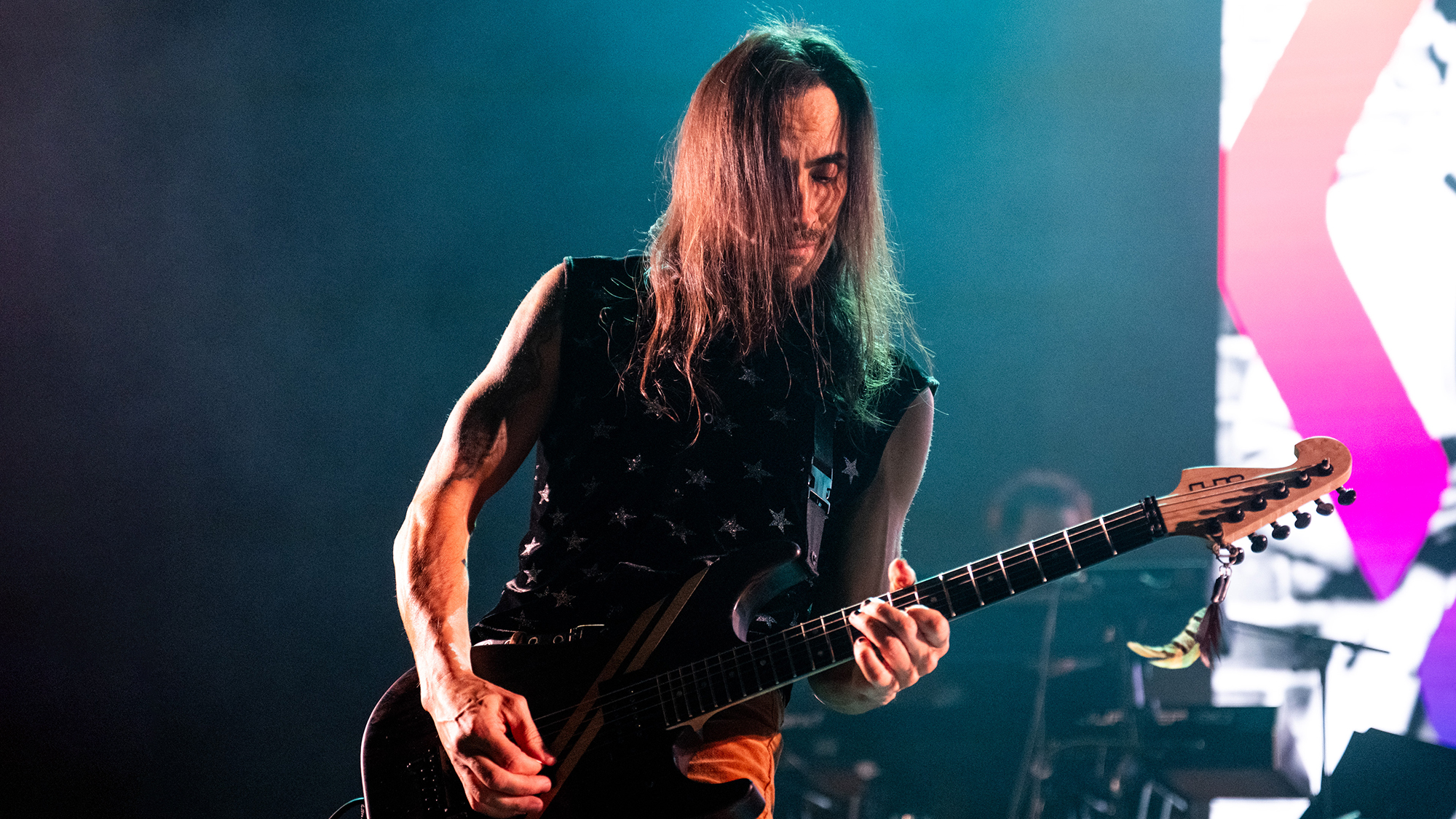Julien Baker: “Nothing about it is really haphazard – even the stuff that sounds intentionally lo-fi, or minimalist, is actually very calculated”
The new year has only just begun, but if 2021 has up its sleeves an indie-rock album more emphatic or ethereal than Julien Baker’s latest, we’ll eat our damn hats.

With her road-worn, off-white Tele in hand and her scratchy, sugar-sweetened ruminations on millennial angst, broken love and stormy inner crises, Julien Baker makes a theatre full of twenty-somethings feel like one incredibly gigantic, overly sweaty family reunion. It beggars belief how such simple indie-rock songs can burst through the barriers of emotional reclusivity; no matter how deep your feelings are buried, Julien wields the power to unearth them with no more than three chords and a sharp hook. And – like she does her own over three earnest and urgent studio albums – she encourages you to embrace those feelings.
The latest of her studio output is Little Oblivions: an album that builds on Baker’s typically sparse and subdued soundscapes with a headphone-filling avalanche of luscious full-band instrumentation, daring thematic bombshells, and stylistic detours that show just how strong Baker’s creative palate has grown in the five years since releasing 2017’s Turn Out The Lights. It’s an album as powerful as it is personal, and one certainly poised to launch Baker to enormous new heights.
Before the record bumps her right up from theatres to arenas, Baker sat down to run Australian Guitar through all its kaleidoscopic peaks and valleys.
So first of all, this album sounds absolutely beautiful. And that’s not to say your first two records don’t, but where those shine more for their sparseness and rawness, this album is beautiful more for how rich and dense – almost poppy – it sounds in parts.
It’s interesting, because I feel like there’s two aspects there to talk about. There’s the idea of moving to a full-band sound, which isn’t actually what we did. I played most of the drums and all the other instruments on the record, and then Calvin [Lauber], who helped me engineer the record, plays drums on one song and a synth on a couple of things. It’s very much an individual-with-one-other-person kind of collaboration, but it does sound like a full-band thing. And that’s new! I mean, we’ve been doing live sessions and trying to make the studio versions of the songs translate to a live setting for a while, but as far as the record itself goes, that was very new.
And then there’s that notion of it being a pop-centric record, and yeah, man, that’s something that more than one interviewer has said to me! Maybe that was a subconscious influence on this record, which I maybe didn’t even realise. Because I didn’t deliberately set out to make a pop record. I know there are some songs on the record that, to me, sound like old 2000s emo bands, and that’s definitely what I wanted to be channeling there. But they must have totally different analogues in other people’s mental discographies, y’know?
Did that present much of a challenge for you as a songwriter, having all these new elements to work with and stylistic techniques to embrace?
I guess it depends on whether you’re talking about the practise of songwriting encompassing production and arrangement, along with lyricism. Because I had all the songs written in my head and I knew how I wanted them all to sound in 2019, and then we recorded the majority of them, the new tracks and overdubs and things, throughout that year and into 2020. It’s funny because not a tonne about my songwriting process changed, but a lot about the recording process did – and how much time I would spend on songs. When I write a song by myself in my room, with whatever instruments are available to me, that’s the purest version of the song – that’s its most stripped and vulnerable version. But I started to open myself up more to the idea of using percussive elements and synths, and bizarre noises and overdriven guitars.
It was pretty challenging. I mean, it was mostly challenging because I’m not good at drums – I have a basic understanding of how drums work, I guess. The person who plays drums with me live is Matthew Gilliam, who was in Forrister, and he’s incredible at drums! But I wanted the drums on this record to have an “un-drummerly” sound on purpose, y’know? And it’s funny because when I think of “un-drummerly” sounds, I always find myself referencing Jason McGerr’s drums. He’s a professional drummer – he drums in Death Cab For Cutie and he played drums on The Con by Tegan & Sara – but those drums are so… I don’t know, they’re so much different than a solo drummer, or a metal drummer who has rudiments down to 30-second notes. And that’s kind of the sound I wanted to go for. I thought, “Well, if I play drums badly, it might sound like Jason McGerr’s actual genius.” And it doesn’t [laughs].
All the latest guitar news, interviews, lessons, reviews, deals and more, direct to your inbox!
It’s “abstract”.
Yeah, there we go! Exactly! But y’know, I feel like that would almost be oversimplifying it. I recently made a score, and it was pretty minimal and electronically based. It was the experience of having the thought, like, “I could make a Jackson Pollock! A two-year-old could make a Jackson Pollock!” But then going and trying to do it, and realising how actually hard and deliberate the process is… Nothing about it is really haphazard – even the stuff that sounds intentionally low-fi, or intentionally minimalist, is actually very calculated.
What did your guitar rig look like for LP3?
It’s always interesting talking to guitar magazines because I was never a guitar buff. For the longest time, I used an Ibanez Artcore, and then I got a Mexican Tele that I used for quite a while, and now what I’m playing is a solid maple American Standard Tele with a Lollard soapbar in the neck. I never quite liked the three-pickup Tex-Mex sound, and I never quite liked dual-bucker Deluxe Teles because they were always just too aggressive for me. But I’m also finding out that that was probably just because I’d put way too high-powered a speaker into my amp as a child, and I thought every guitar was way too aggressive for me. But y’know, that’s learning where distortion comes from, what pickup distortion and overdrive and pedal distortion are, and how amps process all of that. But yeah, I was jamming mostly that American Standard Tele.
What’s kept you faithful to the Telecaster?
As a child, I never had much breadth of knowledge about guitars. I got an SG, and I didn’t really like my SG because the neck was too thick. Then I had an Ibanez Artcore, which I got because I wanted a hollowbody Gretsch or ES-335 but I couldn’t afford one. And I mean, no shame on Ibanez! They have some great guitars, but that one just didn’t have particularly good hardware, so I replaced it with a Telecaster – and that was, like, the Goldilocks zone. But it’s interesting because it’s like proximity breeding complacency – I know a Telecaster, I know how a Telecaster is supposed to sound and how it’s supposed to work, and I’ve always just felt like there’s not much I couldn’t accomplish with it.
I remember my dad saying to me when I was a kid, “You ever see rock bands where they switch guitars every song? Well when you watch AC/DC, [Angus Young] is just playing one guitar!” I don’t know how true that is – I’ve never seen AC/DC play – but I somehow internalised that as though I should only have one guitar that just does the job, y’know?

Ellie Robinson is an Australian writer, editor and dog enthusiast with a keen ear for pop-rock and a keen tongue for actual Pop Rocks. Her bylines include music rag staples like NME, BLUNT, Mixdown and, of course, Australian Guitar (where she also serves as Editor-at-Large), but also less expected fare like TV Soap and Snowboarding Australia. Her go-to guitar is a Fender Player Tele, which, controversially, she only picked up after she'd joined the team at Australian Guitar. Before then, Ellie was a keyboardist – thankfully, the AG crew helped her see the light…

